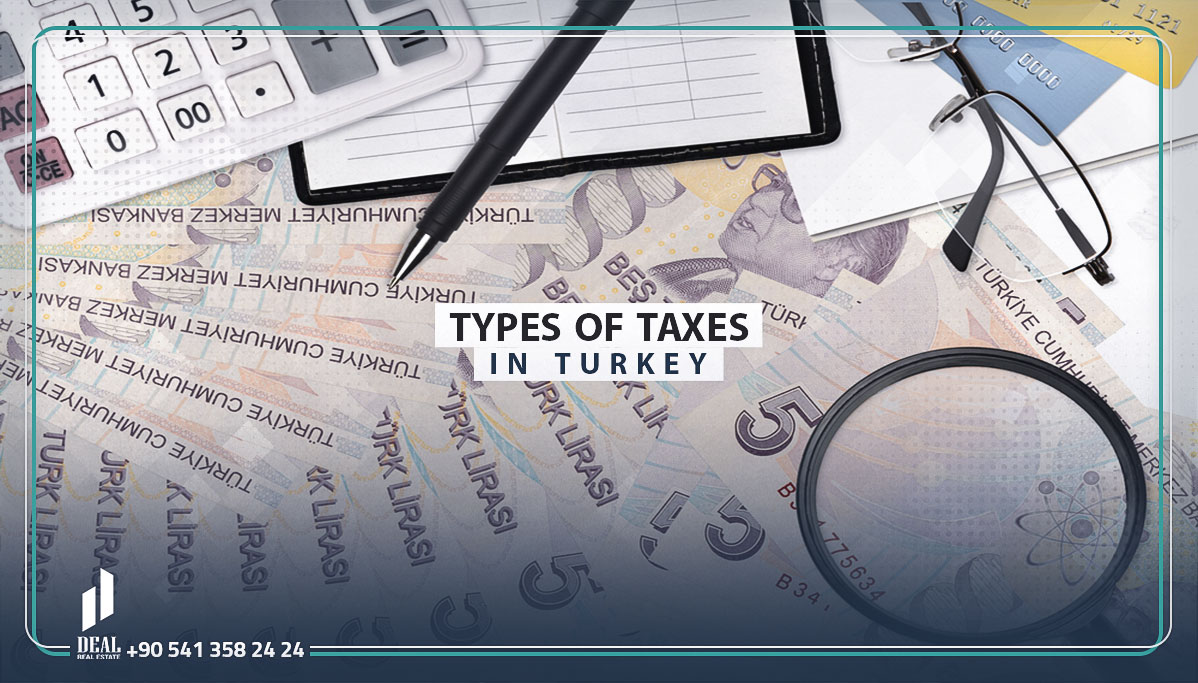Types of taxes in Turkey
Get to know the types and costs of taxes in Turkey

It is generally noticed that the Turkish people have extensive knowledge about the issue of taxes in Turkey due to the great interest that the Turkish government attaches to tax collection. Therefore, if you want to reside in Turkey as a foreign citizen, you must have enough information to know your duties and the dues that you should Pay it while at the same time being aware of your rights.
Firstly: Foreigners and paying taxes in Turkey:
Turkey is distinguished from other investment areas in that it does not impose any additional taxes on foreigners residing in it, whether they are there for real estate investment in Turkey or residency only, as any economic activity in Turkey entails paying tax costs, i.e., taxes, but these taxes are equal in value. Whatever the nationality of the person who has to pay it.
As for the additional costs that foreigners may have to pay in Turkey, they are simple costs related to the fees for translating official documents and the cost of the sworn translator or when using the services of a real estate agent or in the event of the need to secure employment opportunities for the Turks within the company that opens it in Turkish territory as a foreign person and all these expenses. Therefore, they have not considered taxes or included them in their classifications.
Types of taxes in Turkey:
1- Income taxes in Turkey:
Income taxes in Turkey, in turn, are divided into two parts, the first is the individual income tax, and the second is the corporate income tax. The value of the income tax in Turkey is calculated by relying on two primary principles،each of the elements and sources of income, whether for the individual or company and also the net value of income.
* Individual income tax in Turkey:
To determine this tax, work is done to calculate the net amount of the gains and revenues that the individual may have achieved during one year. Individual income taxes are calculated through a set of elements, including commercial and agriculture, and the individual's monthly salary and income. However, independent services are not limited to a specific salary and the value of the rent the individual receives if he owns real estate invested in leasing and the income of movable property proceeds, i.e., financial investments.
As for the elements of income and gains located outside Turkey, their value is calculated in conjunction with the gains inside Turkey together for Turkish citizens and those residing within Turkish territory for a period exceeding six months.
But those who reside outside the Turkish lands or who reside in Turkey for fewer than six months are calculated only as their sources of income and earnings in Turkey.
* Corporate income tax in Turkey:
When the source of income or financial income is by a company or institution in Turkey, the taxes that are due are paid by the legal authorities representing this institution or company. It is included in the calculation of the corporate income tax value for each of the companies, associations, and public economic establishments, as well as economic establishments. Institutions, associations, and joint ventures between the public and private sectors own it.
2- Expenditure taxes in Turkey:
Expenditure taxes are also divided into several types, including:
- Value-added tax in Turkey:
This type of tax is imposed on goods and services of a commercial, industrial, and agricultural nature, as well as on independent crafts, goods, and services that are imported into Turkey, i.e., imports, as well as on the delivery of goods and services, and both imports and services are exempt from value-added tax. Roaming inside Turkey, whether provided to residents inside or outside Turkey, manufacturers inside free zones, oil exploration operations, seaports and airports services provided to ships and airplanes, as well as machinery and equipment that are imported, transit transport, and goods delivery operations are also exempt. The services carried out by representatives of foreign consulates in Turkey and the services of international organizations and their employees are also exempt from these taxes, insurance transactions, and banks.
- Special consumption tax in Turkey:
The special consumption tax is imposed on specific groups of services, which can be classified into four primary groups, and the value of the tax imposed on each one of these products differs. These groups include petroleum products, i.e., oil derivatives, lubricants, solvents and their derivatives, and natural gas—the second group includes cars, motorcycles, airplanes, helicopters, and yachts. In contrast, the third group includes tobacco and alcoholic beverages, and the list includes entertainment products of all kinds. The special consumption tax in Turkey is characterized as being paid only once.
- The tax of banking transactions and insurance transactions in Turkey:
This tax is calculated based on the income earned through banks and banks, mainly those profits made through bank loans. As a result, the maximum value of insurance tax and bank transactions equals five ٪, while the tax resulting from bank deposit transactions is only one ٪. And the imposition of a tax on all foreign exchange transactions that take place in Turkey has been canceled since the year 2008.
Have Question Or Suggestion ?
Please Share Your Thought, To Make It Real


